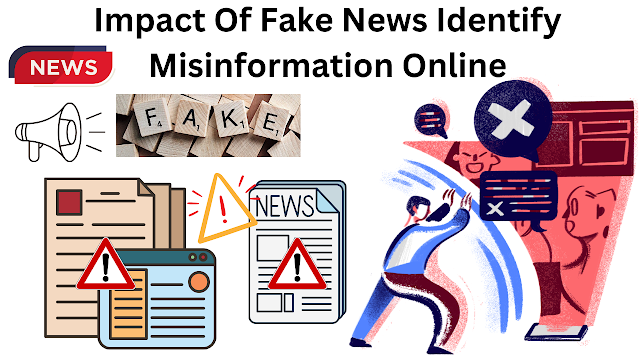Impact Of Fake News Identify Misinformation Online
Understanding the Impact of Fake News: How to Identify and Combat Misinformation Online
In the digital era, the prevalence of fake news has become a significant concern, posing a threat to the integrity of information dissemination and public opinion. The rapid evolution of technology and the rise of social media platforms have facilitated the rapid spread of misinformation, leading to potentially severe consequences for individuals, communities, and societies at large. As the line between fact and fiction continues to blur, it has become imperative for individuals to develop the critical skills necessary to discern the authenticity of the information they encounter online. This article aims to delve into the impact of fake news, provide insights on identifying misinformation, and offer strategies to combat the dissemination of false information online.
 |
| Impact Of Fake News Identify Misinformation Online |
Understanding the Impact of Fake News
The widespread dissemination of fake news has the potential to cause substantial harm, ranging from individual beliefs and behaviors to societal stability and political landscapes. The impact of fake news can be seen in various facets of society, including:
- Public Perception and Trust: The proliferation of fake news can significantly erode public trust in media outlets and other information sources, leading to skepticism and confusion among the general population.
- Political Instability: Fake news has the power to sway public opinion, influence election outcomes, and even exacerbate existing political divides, thereby threatening the stability of democratic processes.
- Social Consequences: Misinformation can incite fear, panic, and hostility within communities, contributing to social unrest and the perpetuation of harmful stereotypes and prejudices.
- Economic Ramifications: The dissemination of false information can impact financial markets, leading to economic instability and volatility, as investors react to misinformation rather than factual data.
Identifying Misinformation Online
Recognizing and discerning misinformation from legitimate information is crucial in combating the spread of fake news. Here are some key strategies to help individuals identify misinformation online:
- Source Evaluation: Assess the credibility of the source by examining the publication's reputation, author expertise, and potential biases. Cross-referencing information with multiple reliable sources can help validate the authenticity of the content.
- Fact-Checking Tools: Utilize fact-checking tools and websites to verify the accuracy of the information presented. Fact-checking platforms such as Snopes, FactCheck.org, and PolitiFact can help users determine the validity of claims and news articles.
- Critical Analysis: Practice critical thinking by analyzing the content for logical fallacies, inconsistencies, or sensationalized language that may indicate a lack of credibility. Scrutinizing the evidence presented and evaluating the context of the information can aid in detecting misinformation.
- Reviewing Supporting Evidence: Examine the supporting evidence, data, or references provided within the content. Lack of verifiable sources or reliance on anecdotal evidence without credible backing can be indicative of misinformation.
- Awareness of Emotional Triggers: Be mindful of emotionally charged language or content designed to evoke strong emotional responses. Misinformation often exploits emotions to manipulate readers, so remaining vigilant against such tactics is essential.
Combating the Dissemination of Fake News
Effectively combating the spread of fake news requires a collective effort involving individuals, media organizations, and technology companies. Implementing the following measures can help mitigate the impact of fake news and promote a more informed digital environment:
- Media Literacy Education: Integrate media literacy education into school curricula and community programs to equip individuals with the necessary skills to critically evaluate information and navigate the complexities of the digital landscape.
- Strengthened Fact-Checking Initiatives: Support and promote fact-checking initiatives within media organizations and encourage the implementation of rigorous fact-checking processes to verify the accuracy of news stories before publication.
- Transparent Content Policies: Encourage transparency within social media platforms and digital content providers by implementing clear content policies and guidelines to regulate the dissemination of false information and misleading content.
- Enhanced Algorithmic Accountability: Advocate for increased accountability among technology companies by fostering transparency in algorithmic processes and promoting the development of algorithms that prioritize the promotion of credible and verified information.
- Community Engagement and Collaboration: Foster collaborative efforts between communities, policymakers, and technology companies to raise awareness, promote digital literacy, and develop effective strategies to combat the spread of fake news.
Conclusion
The prevalence of fake news in the digital landscape presents a formidable challenge that necessitates proactive measures to safeguard the integrity of information and promote a more informed society. By understanding the far-reaching impact of fake news, mastering the art of identifying misinformation, and implementing effective strategies to combat its dissemination, individuals can contribute to fostering a more transparent and trustworthy digital environment. Empowering individuals with the tools and knowledge necessary to navigate the complexities of the digital world is paramount in preserving the integrity of information and upholding the principles of truth and accuracy in the digital age.